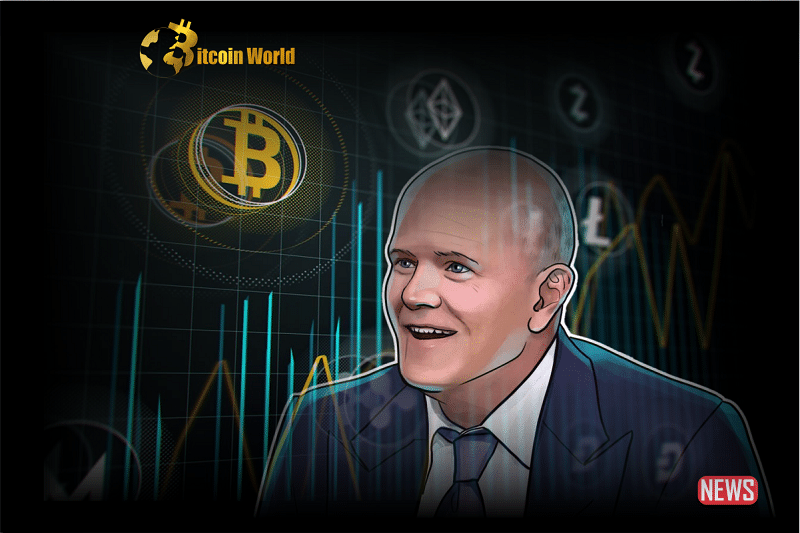The cryptocurrency market, while holding steady, hasn’t exactly been setting the world on fire lately. You might have noticed a certain… *lackadaisical* vibe, as Galaxy Digital CEO Mike Novogratz aptly put it. The big players, the institutional investors, seem to be sitting on the sidelines. But is this lull permanent? Novogratz, along with other industry experts, sees a potential spark on the horizon, and it’s coming from the East. Let’s dive into what’s happening and why Asia, particularly Hong Kong, could be the catalyst the crypto market needs.
Where’s the Institutional Buzz?
Novogratz didn’t mince words in a recent CNBC interview, highlighting the absence of significant institutional buying. While retail investors are keeping the lights on with their consistent, albeit smaller, investments, the big money is staying put. Think of it like a concert venue – the fans are there, but the headliner hasn’t taken the stage yet.
This sentiment is echoed by data. CoinShares reported institutional digital asset purchases experiencing outflows for six consecutive weeks, totaling a significant $39 million. This clearly indicates a cooling of interest from larger investors in the short term.
Asia: Two Potential Game Changers
Despite the current market sentiment, Novogratz isn’t waving the white flag. He points to two key developments in Asia that could dramatically shift the landscape:
- WeChat Embraces Bitcoin: Imagine the impact of instant access to Bitcoin price quotes for over a billion people. That’s precisely what’s happening with WeChat, the ubiquitous Chinese social media app. With a staggering 1.3 billion monthly active users, the integration of Bitcoin price information, currently showing around $27,138, is a monumental step. Think of it as planting a seed in a massive garden – the potential for growth is enormous.
- Hong Kong Opens Its Doors: For the first time, retail customers in Hong Kong can now trade cryptocurrencies on regulated exchanges. This is a significant policy shift, signaling a welcoming stance towards digital assets. It’s like setting up a crypto playground in a major financial hub, attracting both local and international players.
Hong Kong: A Budding Crypto Hub?
Why is Hong Kong’s move so important?
Tommy Honan, Head of Product Strategy at Swyftx, shares Novogratz’s optimism about Hong Kong. He acknowledges the recent dip in institutional activity, partly attributed to the pressure of rising living costs on retail investors. However, he sees Hong Kong as a beacon of opportunity.
Here’s why Hong Kong’s emergence as a crypto hub is generating excitement:
- Attracting New Investment: Hong Kong’s regulatory clarity is a magnet for investors who have been hesitant due to uncertainty in other regions. It provides a safe and regulated environment for participation.
- Strategic Location for US Firms: For US-based crypto companies navigating a complex regulatory environment at home, Hong Kong offers a strategic foothold in the Asian market. It’s like having a bridge to a potentially massive user base.
- Increased Competition: The crypto-friendly stance has sparked a race among companies to secure licenses in Hong Kong, fostering innovation and competition within the market.
What are the potential benefits?
Hong Kong’s proactive approach could lead to several positive outcomes:
- Market Rejuvenation: Increased activity and investment from Asia can inject fresh energy into the global crypto market.
- Price Discovery: More trading activity can lead to more efficient and accurate price discovery for cryptocurrencies.
- Innovation and Development: A thriving crypto hub can foster innovation and the development of new blockchain-based technologies and applications.
Are there challenges?
While the outlook is positive, some challenges remain:
- Global Regulatory Landscape: The overall global regulatory environment for cryptocurrencies remains fragmented and uncertain.
- Competition from Other Regions: Other regions are also vying to become crypto hubs, so Hong Kong needs to maintain its competitive edge.
- Adoption Rate: While access is improving, widespread adoption takes time and education.
The US Factor: Regulations and Politics
Honan also touches upon the regulatory hurdles in the United States. He believes a significant price recovery will occur when major firms re-enter the market. However, this hinges on:
- Clear and Sensible Regulations: Institutional investors crave clarity and predictability. Well-defined regulations will provide the necessary confidence to deploy significant capital.
- Favorable Political Environment: Political shifts, such as a potential Republican victory in the US elections, could create a more supportive environment for the crypto industry.
Looking Ahead: Awaiting the Institutional Return
The current crypto market might feel a bit like waiting for the rain to stop in a drought. While retail interest provides a base, the real downpour – the surge of institutional investment – is what’s needed for significant growth. Novogratz and Honan believe that the developments in Asia, particularly Hong Kong’s embrace of cryptocurrencies, offer a glimmer of hope.
Actionable Insight: Keep a close eye on regulatory developments in both Asia and the US. These will be key indicators of future institutional involvement.
Conclusion: A Spark in the East?
While the immediate enthusiasm from institutional investors might be lacking, the groundwork for future growth is being laid, particularly in Asia. Hong Kong’s emergence as a regulated crypto hub, coupled with the increased visibility of Bitcoin through platforms like WeChat, presents a compelling narrative. The crypto community is watching closely, hoping these developments will indeed be the catalyst for the next bullish phase and the return of significant institutional capital. The East may very well hold the key to unlocking the next chapter in the cryptocurrency story.
Disclaimer: The information provided is not trading advice, Bitcoinworld.co.in holds no liability for any investments made based on the information provided on this page. We strongly recommend independent research and/or consultation with a qualified professional before making any investment decisions.




